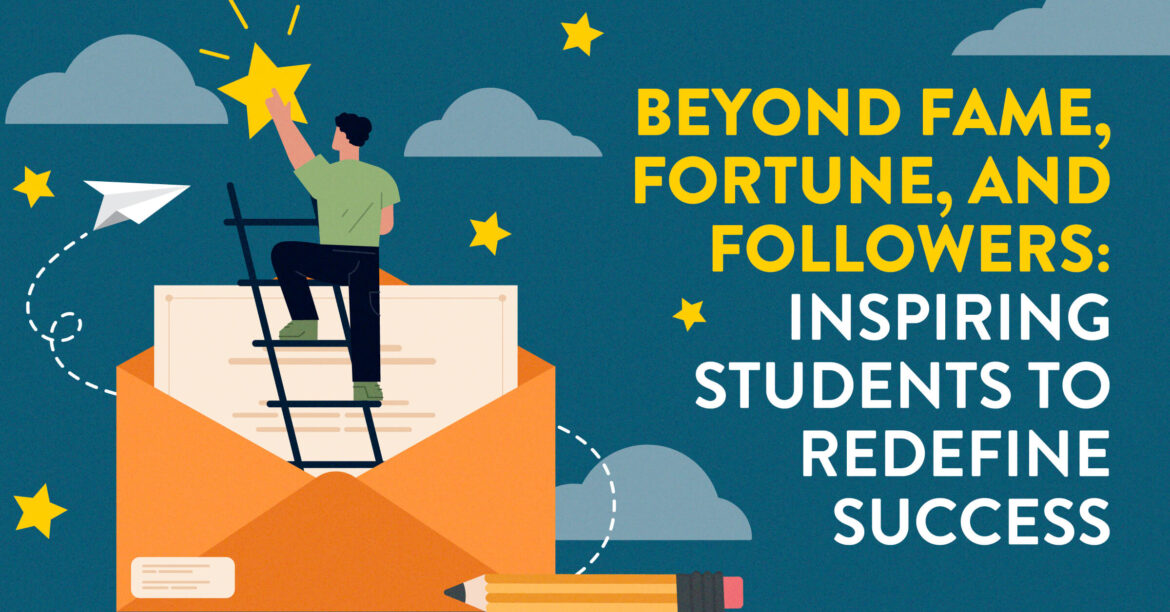As a teacher, you sometimes veer off the beaten path—not because the curriculum told you to, but because your gut did.
One year, I started to notice a troubling trend: many of my students equated success with fame, followers, or a fat bank account. To them, success looked like a YouTuber with a million subscribers or someone throwing a ball—whether it’s football, baseball, or soccer—on TV.
Of course, not every student saw themselves on a field or in front of a camera. A few dreamed of becoming famous musicians or actors. One even swore they’d live in a mansion with a pet tiger, “just like in that one rap video.” Another said they’d be a “professional shopper” because influencers always had new clothes and countless unboxing videos. One student told me he wanted to be “so rich he’d never have to do dishes again.” To him, success meant hiring people to do the boring stuff.
I knew my students weren’t entirely to blame for these perspectives. This is simply the world they’re growing up in. But I also knew I could show them something different, a version of success that was quieter, deeper, and rooted in grit rather than glitz. So, I decided to show them that success has many faces—and most of them aren’t filtered on Instagram.
I sat down one night and made a list. Not of the usual suspects, but of lesser-known (to kids, anyway) people who had achieved incredible things in politics, sports, business, journalism, and entertainment. These were folks who had worked hard, faced rejection, and kept going anyway—the kind of people whose names weren’t plastered on lunchboxes, but whose stories deserved to be told.
Then came the assignment: each student would be given a name, and their job was to do a bit of research and write a handwritten letter. Not an email. Not a Snap. A letter. On paper. With a pen. And mail it, complete with a stamp. (This was already a mind-blowing history lesson in itself.)
They asked about careers, life choices, defining moments, and—most importantly—what their pen pal believed success really meant. And then… we waited.
At first, the school mailbox was quiet. A few forms. Maybe an office memo or two. But then, something special happened. One day, a letter arrived addressed to one of my students—handwritten, thoughtful, and warm. And then another came. And another. Soon, the office staff were bringing down stacks of envelopes with grins on their faces, saying, “You’ve got more mail!” Our classroom started to feel like Santa’s workshop.
Each letter was heartfelt, personal, and encouraging. And they all carried a common theme: success is not about wealth or fame, it’s about living your life with intention, kindness, and determination. The students were stunned. Wait… you could be successful and not have your own merch line?
From there, it became something more than a project. Students wrote back. Letters turned into friendships. One student even got a phone call—yes, an actual phone call—from none other than legendary actor Dustin Hoffman. They talked for 45 minutes. About life. About family. About a middle school crush. (Because who wouldn’t ask Dustin Hoffman for dating advice?)
But the most powerful moment came from a student who had recently lost her sibling in a tragic accident. The person she’d written to, a well-known entertainer, shared that he had lost his parents at a young age. He told her she could write to him anytime—and she did. What started as a school assignment became a real, lasting friendship that continues to this day.
None of this was part of the curriculum. It wasn’t tied to any standard, benchmark, or test score. But it changed lives. It reminded my students—and me—that success isn’t about going viral. It’s about connection. It’s about resilience. It’s about how you treat others, and how you carry yourself when no one’s watching.
And it reminded me that sometimes, the best lessons don’t come from a lesson plan. They come from listening to your students, following your instincts, and trusting that learning isn’t always about what we teach. Sometimes, it’s about what we inspire.
And occasionally, it’s about getting relationship advice from an Oscar-winning actor too.


